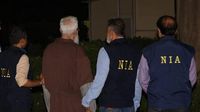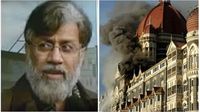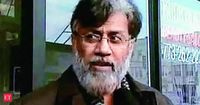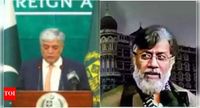Tahawwur Hussain Rana, a key accused in the 2008 Mumbai terror attacks, has been extradited from the United States to India, marking a significant step in the long pursuit of justice for the victims of one of the deadliest terrorist attacks in the country's history. Rana, who is a Pakistani-origin Canadian national, landed in Delhi on April 10, 2025, after the US Supreme Court dismissed his final appeal against extradition, allowing Indian authorities to proceed with legal actions against him.
Rana, 64, was taken into custody by the National Investigation Agency (NIA) immediately upon his arrival at Indira Gandhi International Airport. He is expected to be presented before a special NIA court shortly, where he will face charges related to his alleged involvement in the planning and execution of the Mumbai attacks that resulted in the deaths of 166 people, including six Americans.
Pakistan has distanced itself from Rana, asserting that he is a Canadian national who has not renewed his Pakistani documents in over two decades. Shafqat Ali Khan, a spokesperson for the Pakistan Foreign Office, stated during a press briefing, "He is a Canadian national and as per our record he has not renewed his Pakistani documents for over two decades." This statement reflects Pakistan's attempt to distance itself from the controversial figure, who has been linked to the Lashkar-e-Taiba (LeT), the terrorist organization behind the attacks.
Born in Pakistan in 1961, Rana served as a doctor in the Pakistani Army before migrating to Canada in the 1990s and obtaining citizenship there in the early 2000s. His extradition follows years of legal battles in the US, where he was convicted for his role in supporting terrorist plots, including an abortive attack against a Danish newspaper.
Rana's close association with David Coleman Headley, another key conspirator in the Mumbai attacks, has been well-documented. Headley, a Pakistani-American, conducted reconnaissance missions in Mumbai prior to the attacks and testified that Rana provided logistical and financial support for the operation. According to Headley, he used Rana’s immigration consultancy as a front to establish a Mumbai office, facilitating his surveillance of potential attack sites.
The 2008 Mumbai attacks were a coordinated series of shootings and bombings carried out by ten terrorists from Pakistan, which included assaults on iconic locations such as the Taj Mahal Palace Hotel and the Chhatrapati Shivaji Terminus railway station. The attacks lasted over 60 hours and left a significant mark on India, leading to heightened security measures and strained diplomatic relations between India and Pakistan.
In the aftermath of the attacks, Rana was charged in absentia by the NIA in 2011. Despite being arrested in the US on charges related to supporting terrorism, he managed to delay his extradition through various legal maneuvers. However, the US Supreme Court’s ruling on April 7, 2025, effectively ended his attempts to resist extradition.
As Rana prepares to face trial in India, the NIA is expected to interrogate him extensively regarding his connections to the ISI, Pakistan's intelligence agency, and the operational details of the 26/11 attacks. Former Union Home Secretary RK Singh expressed satisfaction over Rana's extradition, emphasizing that it sends a strong message to terrorists that they will be held accountable for their actions, irrespective of their location.
Security has been heightened around the Patiala House Court in Delhi, where Rana will be presented. Senior advocate Dayan Krishnan, who previously led the arguments for Rana's extradition in the US, will represent the NIA during the trial. Meanwhile, Rana’s defense will be led by advocate Piyush Mishra.
Former Israeli Ambassador to India, Mark Sofer, praised the Indian government's efforts in securing Rana's extradition, stating, "This sends a strong message to terrorists anywhere that India will never give up." His comments highlight the international ramifications of the case, considering the global impact of the Mumbai attacks, which also affected foreign nationals.
Rana's arrival in India has reignited discussions about the role of international cooperation in combating terrorism. The US Department of Justice characterized Rana's extradition as a crucial step toward justice for the victims of the Mumbai attacks. Spokesperson Nicole Navas Oxman remarked, "I can confirm the United States yesterday extradited convicted terrorist Tahawwur Hussain Rana, a Canadian citizen and native of Pakistan, to stand trial in India on 10 criminal charges stemming from his alleged role in the 2008 terrorist attacks in Mumbai."
The NIA has expressed optimism that interrogating Rana will yield critical information about the operational dynamics of the LeT and its connections to the ISI. Officials believe that Rana’s insights could reveal the existence of sleeper cells within India and further elaborate on the planning of the Mumbai attacks.
As the legal proceedings unfold, many are watching closely to see how this case will unfold and what implications it may have for future counter-terrorism efforts. The families of the victims of the Mumbai attacks are hopeful that Rana's extradition will bring them closer to justice and closure.
Rana's case is emblematic of the ongoing struggle against terrorism and the complexities of international law. As India prepares to prosecute him, the world will be watching to see if justice will finally be served for the victims of one of the most notorious terrorist attacks in recent history.










